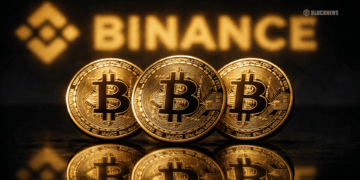In this recap of the crypto world, we will explore the events and news that had the most significant impact in the past week of Aug 21. Our focus will be on the following developments:
- Coinbase x Circle
- Friend.tech Shakes Up the Web3 Space
- OpenSea to Make Royalties Optional
- Mastercard and Binance Part Ways
Coinbase x Circle
Coinbase, the prominent U.S. cryptocurrency exchange, has acquired a minority stake in Circle Internet Financial. This move has effectively led to the dissolution of The Centre Consortium, the entity originally responsible for issuing USDC, the second-largest stablecoin by market capitalization. This transformative step has positioned Circle as the sole issuer of USDC, solidifying the partnership between these major players and ushering in a new era of collaboration.
Coinbase’s decision to secure a stake in Circle goes beyond a simple investment, showcasing its unwavering dedication to the long-term success of the USDC ecosystem. Highlighted by Circle’s CEO, Jeremy Allaire, and Coinbase’s Co-founder & CEO, Brian Armstrong, stablecoins have emerged as a pivotal element within the cryptocurrency space, enabling efficient access to U.S. dollars for a global user base. With USDC leading the charge, millions can swiftly engage in large-scale transactions, leveraging the advantages offered by a digital, programmable currency.
Furthermore, this partnership will extend the availability of USDC even further. By October’s end, USDC is planned to debut on an additional six blockchains, broadening its accessibility to a total of 15 networks. This expansion caters to the increasing demand from businesses, app developers, and crypto communities who prefer USDC for on-chain transactions. Read more on this here.
Friend.tech Shakes Up the Web3 Space
Friend Tech has stormed onto the scene with a decentralized social platform that has the potential to redefine our very understanding of online interactions. The curtains rose on this groundbreaking venture on August 10, marked by an exclusive invite-only beta release.
The platform empowers users to tokenize their social networks, allowing them to exchange “shares” that mirror their social connections. Imagine a stock market where “shares” of friends’ social media profiles are bought and sold. It is an intriguing blend of digital connections and financial markets, where the value of these “shares” hinges on a multitude of factors, from follower counts to engagement levels and overall influence.
One of the standout features of Friend Tech is it offers shareholders access to private chat rooms, establishing an exclusive link between them and the share issuer. This dynamic becomes particularly relevant in an era where prominent individuals often resort to deactivating direct messages on platforms such as Twitter or Discord. In addition to this, expanding its horizon even further, the platform has recently incorporated photo-sharing capabilities, amplifying the multifaceted nature of social connection.
To participate, users need to create a profile linked to their Twitter account. They can then buy and sell shares of their friends, betting on their future popularity. If a friend becomes popular, the share value rises; if popularity drops, the share value falls. Moreover, buying or selling shares earns the issuer a fee, similar to a creator’s royalty.
It is a captivating concept for a decentralized social platform that has sparked the interest of many. Drawing personalities from beyond the crypto space, Friend Tech has seen a surge in participation. Though, central to this excitement is the innovative points system and the tantalizing prospect of a potential airdrop, both adding a layer of intrigue that keeps early adopters and enthusiasts eagerly awaiting what lies ahead. Read more on this here.
OpenSea to Make Royalties Optional
The widely used NFT marketplace, OpenSea, has announced its plan to phase out the Operator Filter, a feature introduced in November 2022 to help creators ensure they receive their rightful share from sales by blocking non-compliant marketplaces. Starting from August 31, OpenSea’s Operator Filter will no longer block marketplace activities. However, it is important to note that for those who have already adopted the feature, especially for collections on non-Ethereum chains, creator fees will continue to be enforced until the end of February 2024.
Following this announcement, Yuga Labs expressed its plan to gradually reduce OpenSea support for “all upgradable contracts and any new collections,” emphasizing its commitment to protecting creator royalties for fair compensation. The BAYC community showed a positive response to the post, and content creators and NFT project founders also commended the action.
Currently, the NFT community is divided between supporters of the cost-effective NFT trading approach seen on platforms like Blur, who argue for alternative methods of compensating creators, and those who firmly advocate for the necessity of paying royalties. Read more on this here.
Mastercard and Binance Part Ways
Mastercard, a major global payments company, has announced its decision to end its partnership with Binance, a prominent crypto exchange. This partnership termination will put an end to their co-branded cryptocurrency card programs in several South American countries. The imminent separation, set to take effect on September 22, marks a noteworthy shift in the dynamics of the cryptocurrency and payments ecosystem.
As the September 22 deadline draws near, participants in these crypto card programs will have a wind-down period to navigate. During this phase, users will be able to smoothly transition by converting their crypto holdings in Binance wallets as the partnership comes to a close.
While Mastercard has not publicly disclosed the specific catalyst behind this move, online conjecture points toward the possibility of increased regulatory scrutiny surrounding the activities of Binance. As per Cointelegraph, the exchange has recently encountered legal challenges, including a lawsuit from the United States Securities and Exchange Commission (SEC) that accuses both Binance and its CEO, Changpeng “CZ” Zhao, of breaching local securities laws. Furthermore, the U.S. Commodity Futures Trading Commission has taken legal action against Binance for inadequate registration with the derivatives regulator. These regulatory pressures may have played a role in Mastercard’s decision to disengage from the partnership.














